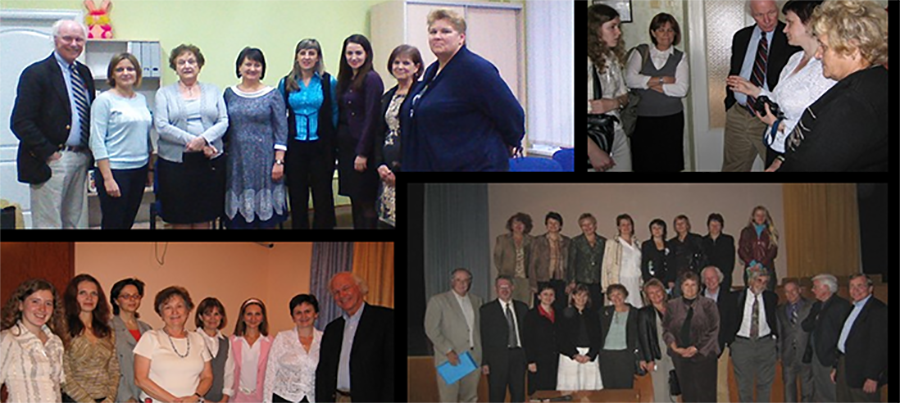Early Identification of Affected Children and Risk Factors for FASD in Ukraine

The Center for MSACD is part of an International partnership for a study being carried out in Western Ukraine by an international team of investigators led by Christina Chambers, PhD, at the University of California at San Diego (UCSD). It is one of the collaborative agreements that make up CIFASD (Collaborative Initiative on Fetal Alcohol Spectrum Disorders). Its goal is to identify methods for the early identification of mothers whose drinking may affect their children’s development and of the children who are most at risk. The study also includes a clinical trial of the effects of maternal nutritional supplements on child development from infancy through early school age. The Center for MSACD at Emory Psychiatry has a subcontract to provide the study with expertise on child development and assessment. The subcontract is led by Claire D. Coles, PhD and Julie A. Kable, PhD, is providing expertise on assessment of neurophysiological methods of prediction.
In the first part of the this study, we examined infant outcomes at 6 and 12 months in Ukrainian infants in two cities in Western Ukraine who are associated with the OmniNet Birth Defects Registry, Rivne and Khmelnitsky, finding that those infants whose mothers took multivitamin and mineral supplements had better outcome than those who did not, even when infants were exposed to alcohol.
In our preschool follow-up, when children were 3 ½ to 4 ½ years old, we examined the persistence of and/or the novel manifestations of neurobehavioral effects of prenatal alcohol exposure in children whose mothers used alcohol using a preschool neurobehavioral battery developed specifically to assess FASD deficits in this age group. Based on previous research, the most likely domains of neurobehavioral functioning that are specific to prenatal alcohol damage were visual-spatial reasoning skills, early executive functioning and information processing. The purpose of the battery was to identify key elements of alcohol-related neurodevelopmental impact that could be predicted by information obtained in the newborn period and during the 6 and 12 month assessments. This included both biological markers, like assessment of maternal immune status and microRNA, as well as early measures of child status including scores on tests of cognition and motor skills and an experimental information processing paradigm that uses infant heart rate as an outcome (COR). Results indicated that these early measures were sensitive to the effects of prenatal alcohol exposure, identifying those children who were affected and predicting to later outcomes.
For the next 5 years, we will continue to follow children as they reach school age to determine the long-term outcomes of the prenatal exposure. To do so, we will measure those domains that were found to be most impacted in the preschool period. Further studies will examine the utility of early biological markers to support the development of measure that can identify affected individuals in infancy to allow for prevention of future problems for both mothers and children.
Funding
This project is funded by the National Institute on Alcohol Abuse and Alcoholism (NIH/NIAAA) via a subcontract with the Center for MSACD from the Department of Pediatrics at the University of California, San Diego. The current study began in 2107 and will continue through 2022. In 2017, we were featured in an article in the NIAAA on-line magazine. Learn more here.
Project Staff (Atlanta)
- Subcontract Principal Investigator: Claire D. Coles, PhD
- Co-Investigator: Julie A. Kable, PhD
Papers Resulting from this Study
- Bandoli G, Coles CD, Kable JA, Wertelecki W., Granovska IV, Pashtepa AO, Chambers CD and the CIFASD (2016) Assessing the joint effects of un-medicated maternal depressive symptoms and alcohol consumption in pregnancy and infant neurodevelopmental outcomes. Alcoholism: Clinical and Experimental Research, 40 (6): 1304-1311. PMID:27129610
- Coles CD, Kable JA, Keen CL, Jones KL, Wertelecki W, Granovska IV, Pashtepa AO, Chambers CD, & and the CIFASD (2015) Dose and Timing of Prenatal Alcohol Exposure and Maternal Nutritional Supplements: Developmental Effects on 6-Month-Old Infants. Maternal and Child Health,19 (12) 2605-2614.PMD: 26164422
- Kable JA, Coles CD, Jones KL, Yevtushok L, Kulikovsky Y, Wertelecki W, Chambers CD, & the CIFASD (2016) Cardiac orienting responses differentiate the impact of prenatal alcohol exposure in Ukrainian Toddlers. Alcoholism: Clinical and Experimental Research, 44,11, 2377-2384, PMID: 27650880
- Kable JA, Coles CD, Keen CL, Uriu-Adams J, Jones KL, Yevtushok L, Kulikovsky Y, Wertelecki W, Chambers CD, & the CIFASD. (2015). The impact of micronutrient supplementation in alcohol-exposed pregnancies on information processing skills in Ukrainian infants. Alcohol, 49, 647-656 [PMID: 26493109].
- Mesa DA, Kable JA, Coles CD, Jones KL, Yevtushok L, Kulikovsky Y, Wertelecki W, Coleman TP, Chambers CD, and the CIFASD (2016,in press) The use of cardiac orienting responses as an early and scalable biomarker of alcohol-related neurodevelopmental impairment. Alcoholism: Clinical and Experimental Research, 41 (11) 128-138. PMID: 27883195.


